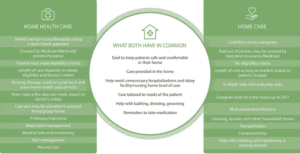In today’s fast-paced world, many families are navigating the delicate balance of work, parenthood, and providing dedicated care for their loved ones who need special medical assistance.
This blog explores why home health care can offer invaluable support, no matter your family’s circumstances, and how it can significantly benefit those in need.
What is Home Health Care?
Home health care is specialized medical support provided at home, serving those with complex medical needs through professionals who offer wound care, medication management, and therapy, all prescribed by a doctor.
Who Qualifies For Home Health Care?
Home health care primarily serves individuals with complex medical requirements.
It’s ideal for:
- Seniors with Challenging Medical Needs
Seniors undergoing medical procedures or managing chronic illnesses require specialized medical interventions.
- Homebound Individuals
Those unable to travel to medical facilities due to fragile health conditions, as home health care brings essential medical services to them.
- Post-Hospital or Rehabilitation Discharge
After being discharged from a hospital or rehabilitation facility, individuals may still require ongoing medical care and monitoring, bridged by home health care.
- Medication Management
Patients needing precise medication administration to ensure proper adherence to prescriptions.
- Patients Needing Skilled Therapy
Skilled therapists, including physical, occupational, or speech therapists, assist patients in recovery and rehabilitation.
How to Qualify for Home Health Care
Qualifying for home health care services can be a crucial step for individuals in need of medical assistance, especially those with developmental disabilities.
There are several ways to qualify for these services:
- Medicare:
If you’re 65 or older or have certain disabilities, Medicare can cover some home health care services when prescribed by a doctor.
- Medicaid:
Medicaid is available for low-income individuals and varies by state. Some states offer Home and Community-Based Services (HCBS) waivers for home health care.
- Private Home Health Care Options
For those who don’t qualify for government programs or need additional services, private home health care agencies offer various services that can be paid for out-of-pocket or through some insurance policies.
- State Programs
In some states, there are programs which help people with developmental disabilities. Arizona’s Division of Developmental Disabilities (DDD), for instance, provides important resources and healthcare coverage through Managed Care Organizations (MCOs) as part of Arizona’s Long Term Care System.
To get DDD services, you usually start with a meeting through their website or at a local office. These state programs work together with home health care to give comprehensive support and improve the lives of people with developmental disabilities.
Remember, a knowledgeable social worker, community or healthcare advocate, or a reputable home health care agency will be your go-to for help with qualification and getting started with home health care for your loved one.
They can guide you through the process, explain your options, and assist in making the right choices to provide the best care for your family member.
You might be curious about home care and whether it’s the same as home health care. That’s a great question, and we’ll explore the distinctions between the two.
Home Health Care vs. Home Care: What Sets Them Apart?

While you search for the ideal solution to meet your family’s needs, you may come across the terms “home health care” and “home care” being used interchangeably, however these terms represent distinct services tailored to different groups of individuals.
Recognizing these differences is vital when choosing the right care for your loved ones.
Home Health Care
Home health care involves licensed medical professionals and services are prescribed by a doctor as a part of a patient’s care plan.
- IV Therapy/Injections
- Medication Management
- Pain Management
- Wound Care
- Any other medical needs
Home Care
Home care provides nonmedical support, including companionship, transportation, meal preparation, and assistance with daily activities.
- Meal preparation
- Companionship
- Transportation
- Light housekeeping
- Help with hygiene and toileting needs
- Medication reminders
Meeting the Needs of Parents and Caregivers: Home Health Care Benefits for Families
Choosing home health care is a significant decision that can often be accompanied by a wave of overwhelming emotions for both families and loved ones. Inviting a team of professionals into your home is an act of trust, where the comfort and well-being of your loved ones are at stake.
In most cases, home health care needs fall into two scenarios: parents caring for children with disabilities, long-term illnesses, and injuries, and children or family members tending to the needs of aging individuals.
While these scenarios are different in nature, they share a common thread – the belief that home is the best place for healing, comfort, and relief, both for the patients and the caregivers.
It’s a journey filled with unique challenges and profound moments of care and support, making the choice of home health care a decision that holds immense importance.
Supporting Parents of Children with Disabilities, Illnesses, or Injuries

Parents who care for children with disabilities, illnesses, or injuries face the daily challenge of balancing work and family responsibilities. This journey is filled with unique challenges where the well-being of their children remains the top priority. Home health care becomes a lifeline, offering personalized support within the comfort of one’s home.
Here are a few benefits that underscore the effectiveness of home health care for children and their families:
- Specialized Care for Unique Needs
Children with disabilities, illnesses, or injuries often require specialized care. Home health care professionals are well-equipped to provide tailored solutions that address each child’s unique needs with care and attention.
- Comfort in Familiar Surroundings
Parents prioritize the well-being and comfort of their children. Home health care allows children to receive essential medical and therapeutic services while remaining in the reassuring environment of their home. This not only promotes physical healing but also enhances emotional well-being.
- Relief from Overwhelm
The responsibilities can be overwhelming for parents, especially when they are also managing work commitments. Home health care professionals provide essential assistance, easing the burden on parents and ensuring their children receive the care and attention they need.
Supporting the ‘Sandwich Generation’ with Home Health Care
The “Sandwich Generation” refers to working professionals who must balance their career demands, raise their own children, and provide care for their aging parents. This intricate juggling act can take a toll on their emotional and physical well-being, underscoring the necessity for effective solutions.
Home health care offers a comprehensive solution, enabling the children or family members responsible for their aging loved ones to meet their work, family, and caregiving obligations. The convenience of receiving specialized medical care and support within their parents’ homes is invaluable.
Here are a few benefits that highlight the effectiveness of home health care for children and family members taking care of aging loved ones who require medical assistance and care at home:
- Preserving Work-Life Balance
Maintaining a healthy work-life balance is essential for working professionals. Home health care enables them to continue their careers and personal lives while ensuring their aging parents receive top-quality care. This balance is vital for their well-being and their parents’ well-being.
- Peace of Mind
One of the greatest benefits of home health care for the ‘Sandwich Generation’ is the peace of mind it provides.
Knowing that their aging parents are well-cared for and safe at home allows these individuals to focus on their jobs and their own families without constant worry about their parents’ well-being.
- Skilled Care and Dignity
Maintaining independence and dignity can be one of the most challenging aspects for caregivers looking after aging parents.
Traniioning from a parent-child relationship to a caregiver-patient dynamic can lead to emotional overwhelm, along with feelings of resentment, shame, and isolation.
Having a home health care team by your side throughout this journey is invaluable; they can assume the medical nursing responsibilities, allowing you to preserve your relationship with your parent or family member.
Recognizing the Right Time for Home Health Care
Caring for a loved one is a deeply personal and often challenging experience.
While your commitment to their well-being is unwavering, there may come a point where it becomes clear that additional support is necessary.
In addition to a doctor’s recommendation for home health care, here are some signs to watch for, whether you’re caring for children with disabilities or aging individuals, suggesting it might be the right time to consider hiring a home health care expert:
- Increasing Medical Needs
If your loved one’s medical requirements become more complex, such as the need for skilled nursing, specialized therapy, or wound care, it’s a sign that professional help is beneficial.
- Safety Concerns
If you notice your loved one struggling to navigate their home safely, with an increased risk of falls or accidents, home health care can provide essential support.
- Family Caregiver Burnout
If you, as a family caregiver, are experiencing burnout, emotional overwhelm, or physical exhaustion due to the demands of caregiving, it’s time to explore home health care options.
- Decline in Independence
A noticeable decline in your loved one’s ability to perform daily tasks or a decrease in their overall independence may indicate the need for home health care.
Choosing the Right Home Health Care Services
After acknowledging the necessity for home health care and seeking an alternative to nursing homes or facility care, the subsequent crucial phase involves identifying the appropriate expert to address your loved one’s specific requirements.
Here’s what to look for when selecting a home-health care professional or team:
Licensing and Certification
Ensure that the home health care provider is licensed and certified to deliver the required services. Check their qualifications and credentials to guarantee the best care.
Experience
Experience matters. Look for a provider with a proven track record of delivering high-quality care, especially for patients with similar needs.
Customized Care Plans
A reputable home health care expert will develop a personalized care plan that caters to your loved one’s unique needs, focusing on their health, comfort, and well-being.
Communication and Collaboration
Effective communication is key. The home health care expert should be skilled in collaborating with the patient, family members, and other healthcare providers to ensure a comprehensive approach to care.
References and Reviews
Seek references or read reviews from other families who have utilized the services of the home health care expert. This can offer valuable insights into the quality of the medical care provided.
Compassion and Empathy
Look for a professional who approaches their work with compassion and empathy. Caring for your loved one should extend beyond medical tasks, encompassing emotional support and understanding.
Nurturing Independence and Well-being Through Home Health Care
Home health care services offer an invaluable solution for parents and caregivers of children with disabilities, illnesses, or injuries, as well as the ‘Sandwich Generation’ facing the challenges of aging parents.
Choosing home health care allows families to strike a balance between their busy lives and the well-being of their loved ones.
We encourage you to reach out to local home health care providers for more information and explore the available resources.
Recognizing the right time for home health care services and selecting the appropriate expert ensures that your loved one receives the best possible care while easing the demands on family caregivers.
This transition not only enhances the quality of care but also fosters a sense of comfort and peace of mind for everyone involved.
Your Path to Enhanced Well-being Begins Today!
If you believe that home health care could benefit your family or if you have questions about how to get started, please contact Estrella Home Health today.
Your journey towards a more balanced and fulfilling life starts.

